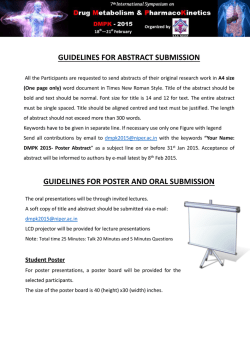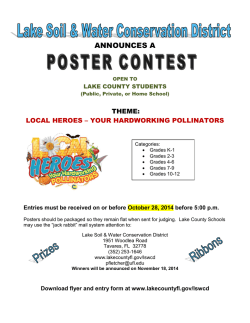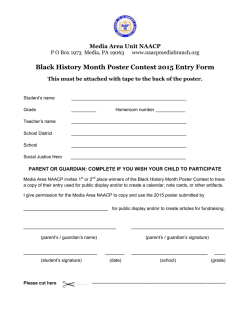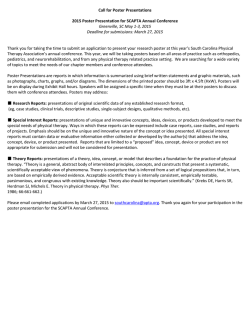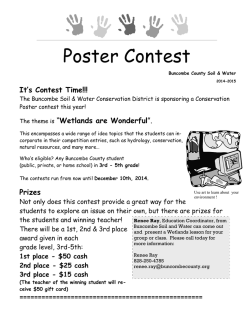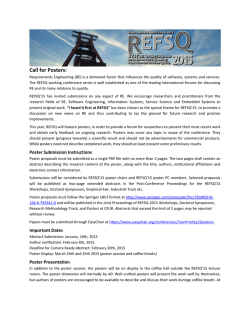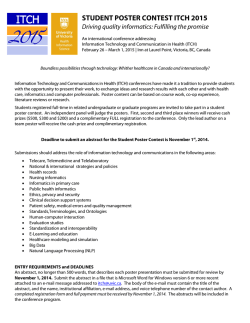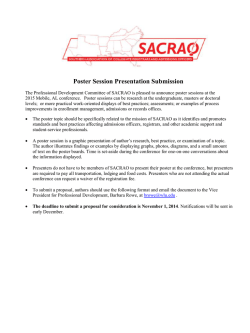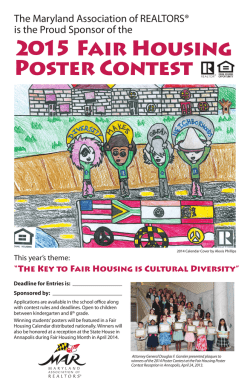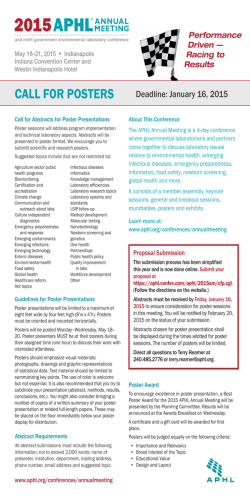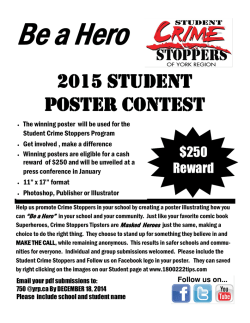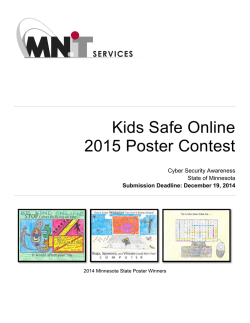
2015 Poster Fact Sheet - American Academy of Family Physicians
NC Poster Presentations The purpose of the National Conference poster competition is to stimulate research by medical students and family medicine residents, to provide a venue to share innovative and effective educational programs, to showcase unique community projects, and to encourage networking among medical students and residents with similar interests. Eligibility: To enter the National Conference poster competition, medical students and family medicine residents must be 1) currently enrolled in an ACGME/AOA accredited residency program or LCME/COCA accredited medical school and 2) a member in good standing of the American Academy of Family Physicians. Presenting author(s) of accepted entries must be AAFP resident or student members, willing to pay for and attend the 2015 National Conference of Family Medicine Residents and Medical Students and be present at their displays during select exposition hall hours. Categories: Entries will be accepted in the following categories: Research – Summarize the results of a well-defined basic or clinical research project, including a hypothesis, dependent and independent variables, tests for measures of association, succinct discussion of data, etc. All work should be original. Projects may involve observational or interventional studies. Clinical Inquiry - Present a clinical scenario with discussion of an actual patient presentation or review current evidence-based recommendations for a clinical topic. A clinical case presentation must include an introduction, case description, and discussion of current practice guidelines for management of the patient. An evidence-based review need not be based on an actual patient presentation, but must provide a systematic review of the current best research evidence to answer a clinical question. The presentation should provide an evidence-based answer on a topic relevant to family medicine and common in everyday practice and include an evidence summary, recommendations from others, and clinical commentary. For a current list of AAFP-approved evidence-based medicine sources, visit www.aafp.org/online/en/home/cme/cmea/ebcme/ebcmesources.html. Community Project – Describe personal experience working on a community-based initiative to improve the health of a specific population (e.g., providing adolescent AIDS education, working with school nurses to develop asthma action plans, establishing a health care program for the homeless, etc.). Student/resident applicant(s) must have served in a leadership role in the planning and execution of the project. The description should include an evaluation of the project. Educational Program – Describe an educational program or curricular innovation that has been evaluated for its impact on medical student or resident training. Student/resident applicant(s) must have played a substantive role in the creation, implementation and/or evaluation of the target program. This may have been done in collaboration with faculty. An applicant(s) needs to state specifically the role he/she played in the program. The subject of the poster presentation must be of value to family medicine and within the scope of family medicine. It may be based on course work or an extracurricular project. All projects must be completed at time of application. Incomplete projects will not be considered. Entries may not be taken from previously published papers. Projects in the categories of research, community project, and educational program will require documentation of consideration or approval from an institutional review board. If accepted for presentation, the printed poster is not needed until the time of National Conference. Application Process: The required application must be completed and submitted to the AAFP by April 10, 2015. An abstract of the poster presentation must accompany the application. Applicants will be notified by May 15. The 2015 application form and guidelines for preparing a poster presentation are available at www.aafp.org/nc. Incomplete applications will not be considered. Display: Entries accepted for presentation will be displayed in the National Conference Exposition Hall. Displays will be limited to one side of a 8’ wide x 4’ high tack board. The recommended poster size is 3’ x 4’. Guidelines for creating and displaying successful posters are available at www.aafp.org/nc. Costs associated with creating, shipping and storing the poster display will be the responsibility of the authors. Author(s) will be required to staff their poster display during select exhibit hours at National Conference. Judging & Awards: Entries will be peer-reviewed and judged on relevance to family medicine, originality/innovative nature of project or question, statement of purpose/goals, project description, evidence-based nature of content, validity of conclusions, and impact on future work. Outstanding poster presentations will be recognized during National Conference with ribbons. No monetary awards are offered. The top resident and top student will earn a trip to the 2015 Family Medicine Experience in Denver, CO to present their posters. Posters will be displayed from September 30 - October 3.
© Copyright 2026
